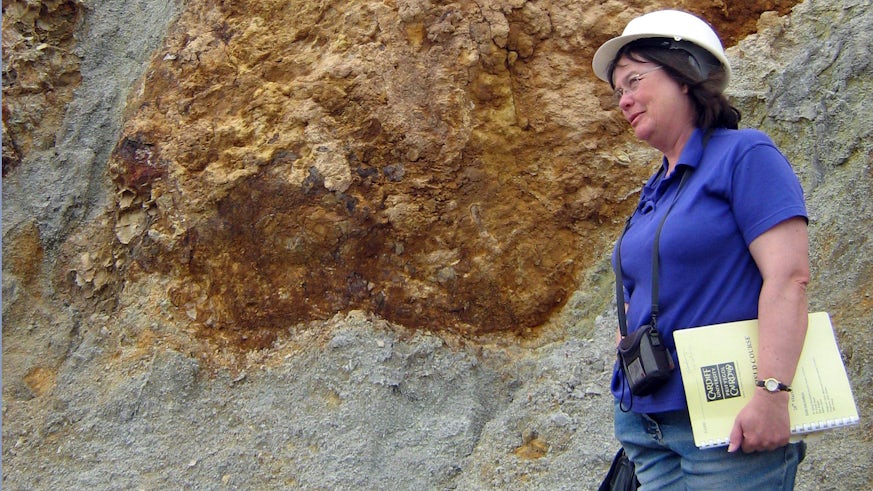Professor Hazel Prichard BSc, PhD, MBA (1954 –2017)
3 January 2017

It is with great sadness that I inform you of the death of Professor Hazel Prichard. Hazel joined the School of Earth and Environmental Sciences as a Royal Society University Fellow in 1992, becoming a Lecturer in 1996 and a Professor in 2016. Hazel served as the Director of the Exploration and Resource Geology BSc degree scheme between 2004-2014 and developed its associated industrial placement scheme. She died in Cardiff after a brave battle with illness on the morning of 1st January, 2017.
Hazel studied Geology and Physical Geography at Hull University (1973-1976) and completed her PhD (1976-1979) on the petrology and geochemistry of the lower oceanic crust at the University of Newcastle-upon Tyne. She was also extremely proud to have completed an MBA at the Open University (1991-1996).
Hazel remained an active researcher until a few weeks before her death. Her contribution to Exploration Geology was profound and enduring. Based on her work in the Shetland Islands Hazel was one of the first to discover that ophiolites, traditionally considered to be platinum (Pt)-poor, could be strongly enriched in this noble metal. Predicting which ophiolites are likely to be Pt-rich became a main focus of her research. She proposed a model whereby only ophiolites that have undergone the critical amount of mantle melting to contain Pt will be platinum- group element (PGE) enriched – too little melting and PGE remain in the mantle whereas too much melting dilutes the PGE in the melt. Testing this model resulted in her numerous papers that reviewed the PGE abundances in ophiolites worldwide. A further focus of her research for which she gained international reputation as being one of the leaders in the field was the characterisation and interpretation of PGE minerals in mafic-ultramafic rocks globally.
More recently Hazel’s research focus turned towards understanding the complex dispersion routes of anthropogenic PGE released into the environment from catalytic converters fitted to vehicle exhausts. Hazel showed that PGE are widespread on roads and are more abundant where traffic flow is high rather than where vehicles stop. She also found that while dispersion results in very low concentrations away from roads, PGE are re-concentrated in acid mine drainage and UK sewage ash. This work led to the widely reported suggestion of the economic potential of PGE from exploitation of such anthropogenically enriched systems.
Hazel was recognised with the award of the Royal Society Senior Brian Mercer Award for innovation in 2004 (with Professor Lynne Macaskie) and appointed as a distinguished visiting scientist at CSIRO, Australia, in 2010, to study 3D textures in PGE-rich chromites using tomography, with Dr Steve Barnes.
Committed to undergraduate teaching and the value of industrial placements, Hazel continued to support these activities for as long as she was able during her illness. Her passion for the industrial placement scheme was infectious and it supported many young geologists who are now themselves prominent industrialists. As a result Hazel was deeply respected by students and won the Cardiff Employability award in the Enriching Student Life Awards, 2014.
Hazel was cherished dearly by all those who knew her well. Her death is a profound loss. Our thoughts are with her husband, David.
Cardiff University